Edie Melson's Blog, page 372
July 11, 2015
Only You
by Beth Vogt @BethVogt
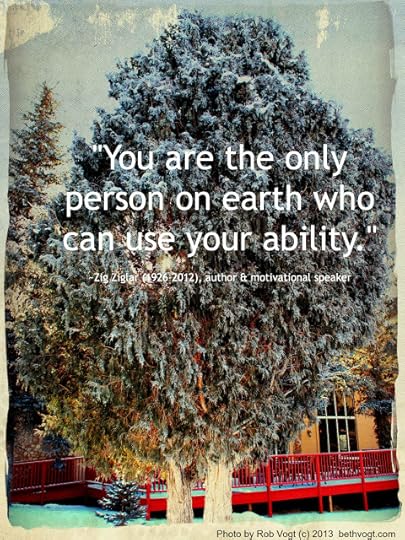 "You are the only person on earth who can use your ability." Zig Ziglar
"You are the only person on earth who can use your ability." Zig Ziglar
There are some things only I can do.
Being me, for example.
Nobody else can be me.
Brilliant deduction, I know.
I spent some time — too much time, to be honest — doubting myself. (Yes, yes, I’ve admitted this before, so I won’t belabor it again.) Lesson learned: Spend too much time doubting yourself and you spend too little time being yourself.
When I finally looked into a mirror and liked who I saw, well, then I could begin to appreciate what I could do. Not in a prideful way that put others down. I could just look at myself and see possibilities. Potential.
Doubt is such a waste of time … a waste of personhood.
Do I still doubt myself sometimes? Oh sure.
But I doubt a choice I’ve made. A yes or a no. I don’t doubt my worth. And just because I can’t do something today doesn’t mean I won’t be able to do it tomorrow … or the next day.
In Your Words: What abilities do you have that make you … you? How have you learned to embrace who you are, moving from doubt to a sense of worth?
TWEETABLE
Only you can use your abilities - thoughts from author @BethVogt on @EdieMelson (Click to Tweet)
 Beth K. Vogt believes God’s best often waits behind the doors marked “Never.” A nonfiction writer and editor who said she’d never write fiction, Beth is now a novelist with Howard Books. She enjoys writing inspirational contemporary romance because she believes there’s more to happily-ever-after than the fairy tales tell us. Connect with Beth on her website, Twitter, Facebook, or check out her blog on quotes, In Others’ Words.
Beth K. Vogt believes God’s best often waits behind the doors marked “Never.” A nonfiction writer and editor who said she’d never write fiction, Beth is now a novelist with Howard Books. She enjoys writing inspirational contemporary romance because she believes there’s more to happily-ever-after than the fairy tales tell us. Connect with Beth on her website, Twitter, Facebook, or check out her blog on quotes, In Others’ Words.
 "You are the only person on earth who can use your ability." Zig Ziglar
"You are the only person on earth who can use your ability." Zig ZiglarThere are some things only I can do.
Being me, for example.
Nobody else can be me.
Brilliant deduction, I know.
I spent some time — too much time, to be honest — doubting myself. (Yes, yes, I’ve admitted this before, so I won’t belabor it again.) Lesson learned: Spend too much time doubting yourself and you spend too little time being yourself.
When I finally looked into a mirror and liked who I saw, well, then I could begin to appreciate what I could do. Not in a prideful way that put others down. I could just look at myself and see possibilities. Potential.
Doubt is such a waste of time … a waste of personhood.
Do I still doubt myself sometimes? Oh sure.
But I doubt a choice I’ve made. A yes or a no. I don’t doubt my worth. And just because I can’t do something today doesn’t mean I won’t be able to do it tomorrow … or the next day.
In Your Words: What abilities do you have that make you … you? How have you learned to embrace who you are, moving from doubt to a sense of worth?
TWEETABLE
Only you can use your abilities - thoughts from author @BethVogt on @EdieMelson (Click to Tweet)
 Beth K. Vogt believes God’s best often waits behind the doors marked “Never.” A nonfiction writer and editor who said she’d never write fiction, Beth is now a novelist with Howard Books. She enjoys writing inspirational contemporary romance because she believes there’s more to happily-ever-after than the fairy tales tell us. Connect with Beth on her website, Twitter, Facebook, or check out her blog on quotes, In Others’ Words.
Beth K. Vogt believes God’s best often waits behind the doors marked “Never.” A nonfiction writer and editor who said she’d never write fiction, Beth is now a novelist with Howard Books. She enjoys writing inspirational contemporary romance because she believes there’s more to happily-ever-after than the fairy tales tell us. Connect with Beth on her website, Twitter, Facebook, or check out her blog on quotes, In Others’ Words.
Published on July 11, 2015 01:00
July 10, 2015
The Speaker One-Sheet is NOT Dead!
by Vonda Skelton @VondaSkelton
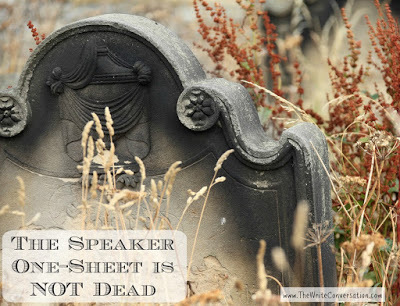 I heard someone say recently that the speaker one-sheet was dead. Well, just as Mark Twain said reports of his death were greatly exaggerated, reports of the death of one-sheets is exaggerated as well.
I heard someone say recently that the speaker one-sheet was dead. Well, just as Mark Twain said reports of his death were greatly exaggerated, reports of the death of one-sheets is exaggerated as well.
The truth is, one-sheets have simply taken on a new medium—the download.
I know I'm showing my age here, but when I first began speaking, event planners wanted a printed one-sheet and the ability to listen to cassette tapes of a full presentation. Then it went to CDs of full presentations. Then CDs of full presentations with excerpts from other presentations. Then it went to DVDs of presentations. Today event planners want a short (1-3 minutes) YouTube or other-hosted video reel of our speaking in a variety of settings. It's often at this point that the event planner will make the first cut and decide who she wants to investigate further.
 But that doesn't mean the one-sheet is dead. After the event planners watch the videos and determine the first cut, then they will often visit or revisit our websites, looking for our one-sheets. If the one-sheet seems to be a good fit as well and we're in the final group to be considered, they will often download and print out the one-sheet for each of the team members or at least have the members look at it. At that point, it's likely the ladies will look at the video links and the one-sheets together and make their final decision, or at least their next cut.
But that doesn't mean the one-sheet is dead. After the event planners watch the videos and determine the first cut, then they will often visit or revisit our websites, looking for our one-sheets. If the one-sheet seems to be a good fit as well and we're in the final group to be considered, they will often download and print out the one-sheet for each of the team members or at least have the members look at it. At that point, it's likely the ladies will look at the video links and the one-sheets together and make their final decision, or at least their next cut.
 The good news is, this means we don't have to spend hundreds of dollars in printing one-sheets. (The last batch of one-sheets I had printed—years ago—ran at least $1 each!) And depending on your graphic art skill level, it may mean you need to invest in a professionally-prepared one-sheet. But whether you pay to have them created or you do them yourself, just remember, it's a reflection of you, so make it as professional as possible.
The good news is, this means we don't have to spend hundreds of dollars in printing one-sheets. (The last batch of one-sheets I had printed—years ago—ran at least $1 each!) And depending on your graphic art skill level, it may mean you need to invest in a professionally-prepared one-sheet. But whether you pay to have them created or you do them yourself, just remember, it's a reflection of you, so make it as professional as possible.
Then make sure it's visible on your website and can be easily downloaded. And don't forget, since Word files with photos and a variety of fonts will often lose their formatting when downloaded, be sure you upload your one-sheet as a PDF file and then print it out to make sure it maintains its formatting.
So there you have it. There's no need to grieve the death of the one-sheet. But there is reason to take a hard look at your sheet and make sure it's a good representation of you and your ministry. It could be the difference between a quick pass or a long-term commitment...with the simple click of a mouse.
So what do you think? Do you have a one-sheet? Do you think you need one? I hope you’ll join the conversation!
TWEETABLEThe Speaker One-Sheet is Not Dead! from author & #speaker @VondaSkelton on @EdieMelson (Click to Tweet)
Yes, you still need a speaker one-sheet - author & #speaker @VondaSkelton shares why (Click to Tweet)
 Vonda Skelton is a speaker and the author of four books: Seeing Through the Lies: Unmasking the Myths Women Believe and the 3-book Bitsy Burroughs mysteries for children 8-12 yo. She’s the founder and co-director of Christian Communicators Conference, offering speakers’ training and community for Christian women called to ministry. Vonda is a frequent instructor at writer’s conferences and keynotes at business, women’s, and associational events. You can find out more about Vonda, as well as writing opportunities and instruction at her writer’s blog, The Christian Writer’s Den at VondaSkelton.com.
Vonda Skelton is a speaker and the author of four books: Seeing Through the Lies: Unmasking the Myths Women Believe and the 3-book Bitsy Burroughs mysteries for children 8-12 yo. She’s the founder and co-director of Christian Communicators Conference, offering speakers’ training and community for Christian women called to ministry. Vonda is a frequent instructor at writer’s conferences and keynotes at business, women’s, and associational events. You can find out more about Vonda, as well as writing opportunities and instruction at her writer’s blog, The Christian Writer’s Den at VondaSkelton.com.
 I heard someone say recently that the speaker one-sheet was dead. Well, just as Mark Twain said reports of his death were greatly exaggerated, reports of the death of one-sheets is exaggerated as well.
I heard someone say recently that the speaker one-sheet was dead. Well, just as Mark Twain said reports of his death were greatly exaggerated, reports of the death of one-sheets is exaggerated as well. The truth is, one-sheets have simply taken on a new medium—the download.
I know I'm showing my age here, but when I first began speaking, event planners wanted a printed one-sheet and the ability to listen to cassette tapes of a full presentation. Then it went to CDs of full presentations. Then CDs of full presentations with excerpts from other presentations. Then it went to DVDs of presentations. Today event planners want a short (1-3 minutes) YouTube or other-hosted video reel of our speaking in a variety of settings. It's often at this point that the event planner will make the first cut and decide who she wants to investigate further.
 But that doesn't mean the one-sheet is dead. After the event planners watch the videos and determine the first cut, then they will often visit or revisit our websites, looking for our one-sheets. If the one-sheet seems to be a good fit as well and we're in the final group to be considered, they will often download and print out the one-sheet for each of the team members or at least have the members look at it. At that point, it's likely the ladies will look at the video links and the one-sheets together and make their final decision, or at least their next cut.
But that doesn't mean the one-sheet is dead. After the event planners watch the videos and determine the first cut, then they will often visit or revisit our websites, looking for our one-sheets. If the one-sheet seems to be a good fit as well and we're in the final group to be considered, they will often download and print out the one-sheet for each of the team members or at least have the members look at it. At that point, it's likely the ladies will look at the video links and the one-sheets together and make their final decision, or at least their next cut. The good news is, this means we don't have to spend hundreds of dollars in printing one-sheets. (The last batch of one-sheets I had printed—years ago—ran at least $1 each!) And depending on your graphic art skill level, it may mean you need to invest in a professionally-prepared one-sheet. But whether you pay to have them created or you do them yourself, just remember, it's a reflection of you, so make it as professional as possible.
The good news is, this means we don't have to spend hundreds of dollars in printing one-sheets. (The last batch of one-sheets I had printed—years ago—ran at least $1 each!) And depending on your graphic art skill level, it may mean you need to invest in a professionally-prepared one-sheet. But whether you pay to have them created or you do them yourself, just remember, it's a reflection of you, so make it as professional as possible.Then make sure it's visible on your website and can be easily downloaded. And don't forget, since Word files with photos and a variety of fonts will often lose their formatting when downloaded, be sure you upload your one-sheet as a PDF file and then print it out to make sure it maintains its formatting.
So there you have it. There's no need to grieve the death of the one-sheet. But there is reason to take a hard look at your sheet and make sure it's a good representation of you and your ministry. It could be the difference between a quick pass or a long-term commitment...with the simple click of a mouse.
So what do you think? Do you have a one-sheet? Do you think you need one? I hope you’ll join the conversation!
TWEETABLEThe Speaker One-Sheet is Not Dead! from author & #speaker @VondaSkelton on @EdieMelson (Click to Tweet)
Yes, you still need a speaker one-sheet - author & #speaker @VondaSkelton shares why (Click to Tweet)
 Vonda Skelton is a speaker and the author of four books: Seeing Through the Lies: Unmasking the Myths Women Believe and the 3-book Bitsy Burroughs mysteries for children 8-12 yo. She’s the founder and co-director of Christian Communicators Conference, offering speakers’ training and community for Christian women called to ministry. Vonda is a frequent instructor at writer’s conferences and keynotes at business, women’s, and associational events. You can find out more about Vonda, as well as writing opportunities and instruction at her writer’s blog, The Christian Writer’s Den at VondaSkelton.com.
Vonda Skelton is a speaker and the author of four books: Seeing Through the Lies: Unmasking the Myths Women Believe and the 3-book Bitsy Burroughs mysteries for children 8-12 yo. She’s the founder and co-director of Christian Communicators Conference, offering speakers’ training and community for Christian women called to ministry. Vonda is a frequent instructor at writer’s conferences and keynotes at business, women’s, and associational events. You can find out more about Vonda, as well as writing opportunities and instruction at her writer’s blog, The Christian Writer’s Den at VondaSkelton.com.
Published on July 10, 2015 01:00
July 9, 2015
Tips to Help You Find Time to Write
by Edie Melson @EdieMelson
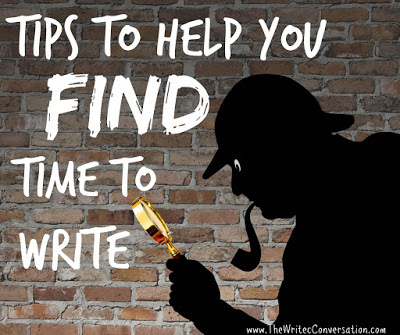 You have to CARVE out time to write—you can't just try to find it!I think one of the biggest obstacles writers face is finding the time to write. It's a common myth to think that time just magically appears.
You have to CARVE out time to write—you can't just try to find it!I think one of the biggest obstacles writers face is finding the time to write. It's a common myth to think that time just magically appears.
Truthfully, we never FIND time to write, we have to carve out time to write.
That’s what separates the wanna-be from the professional.
Here are my tips to make sure I get my writing time in every day.
1. Make an appointment. I’ve learned that if I don’t have it on my calendar, it doesn’t happen. For me, that’s true. My days fill up fast/ but if I have a time scheduled to write, then it happens.
 Quit the guilt!2. Quit with the guilt. For some reason we make everyone else’s dreams and goals a priority. Why do we neglect our own? Is God’s call less important because it’s me?
Quit the guilt!2. Quit with the guilt. For some reason we make everyone else’s dreams and goals a priority. Why do we neglect our own? Is God’s call less important because it’s me?
3. Get ready to make choices. Truthfully you can’t do it all. No one can. How important is writing to you? If you’re like me, you can’t live without writing. A day without writing feels like a failure. It’s the way I process life. But I still have to make choices.
4. Watch the clock (especially online). It’s not enough to sit down at the computer. We also have to turn off the Internet and actually write. Surfing social media doesn’t count. Reading blogs about writing doesn’t count. These are important parts of being an author, but they’re NOT writing!
5. Don’t go it alone.Yes, the act of writing is a solitary process. But you still need a tribe. We need encouragement, accountability, and honesty. As writers we’re not good at objective evaluation. We tend to swing between extremes. Either our writing feels like it’s brilliant, or it’s junk. We need the perspective other writers can bring to the table. And yes, they need to be writers. Non-writers don’t understand the process.
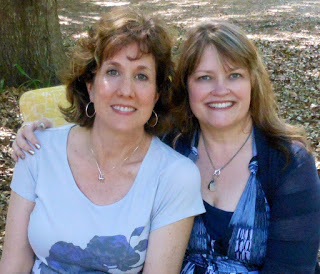 My writing accountability partner, award-winning
My writing accountability partner, award-winning
novelist, Beth Vogt. 6. Evaluate your writing buddies. Yes, we all need writing buddies. But they need to be working writers. Not people who like to sit around and talk about writing. Make sure they’re people who understand the discipline and drive it takes to succeed. You need people who will hold you accountable, not people who’ll help you come with excuses not to write.
7. Be courageous.Failure isn’t the worst thing that can happen to a writer. Often failure teaches us more than success. The worst thing that can happen to a writer is to not write.
8. Learn to write when you don’t feel like it. This is one of the biggest differences between the professional and the amateur. The pros know you have to write whether you’re in the mood or not.
9. Be willing to write junk. So often you have to write junk to get to the jewels. The only thing you can’t fix is a blank page.
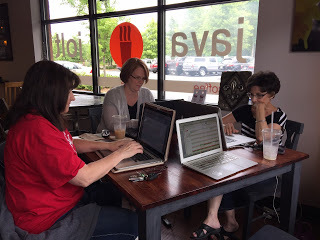 Every week I have a working date with Lynette Eason,
Every week I have a working date with Lynette Eason,
Vonda Skelton, and Alycia Morales!10. Schedule a write-in. Make a date, meet some friends at a local coffee shop and write. Having a group will spur you to higher word counts and amp up the accountability factor.
11. Build in rewards. When I set a goal, I like an incentive. So I build in small rewards for making word count.
12. Take a break. When I get stuck, it helps to do something. I take a short walk, do a quick chore like load the dishwasher. The physical action stimulates my mind. It's also healthy for your back.
13. Write in the spaces. Some days we only have short bits of time in which to write. It’s a myth that we have to have large chunks of time to get something done. An hour is still an hour, even if it’s broken into fifteen minute chunks.
14. Write regularly.When I started out, my kids were young. I couldn’t write during the daytime. So my husband and I worked out a schedule. I’d be with the family during the day and evening. When everyone went to sleep, I’d get back up and write until three or four o’clock in the morning. Then my husband would get the kids up and off to school in the morning while I slept in. It wasn’t a normal schedule, but it was a schedule.
These are my tips to carve out time to write. What would you add to the list? Be sure to leave your thoughts in the comments section below.
Don’t forget to join the conversation!Blessings,Edie
TWEETABLESDon’t fall for the myth – you must MAKE time to write! 14 Tips from @EdieMelson (Click to Tweet)
Moving from wanna-be to professional writer means carvingout time to #write - @EdieMelson (Click to Tweet)
 You have to CARVE out time to write—you can't just try to find it!I think one of the biggest obstacles writers face is finding the time to write. It's a common myth to think that time just magically appears.
You have to CARVE out time to write—you can't just try to find it!I think one of the biggest obstacles writers face is finding the time to write. It's a common myth to think that time just magically appears.Truthfully, we never FIND time to write, we have to carve out time to write.
That’s what separates the wanna-be from the professional.
Here are my tips to make sure I get my writing time in every day.
1. Make an appointment. I’ve learned that if I don’t have it on my calendar, it doesn’t happen. For me, that’s true. My days fill up fast/ but if I have a time scheduled to write, then it happens.
 Quit the guilt!2. Quit with the guilt. For some reason we make everyone else’s dreams and goals a priority. Why do we neglect our own? Is God’s call less important because it’s me?
Quit the guilt!2. Quit with the guilt. For some reason we make everyone else’s dreams and goals a priority. Why do we neglect our own? Is God’s call less important because it’s me? 3. Get ready to make choices. Truthfully you can’t do it all. No one can. How important is writing to you? If you’re like me, you can’t live without writing. A day without writing feels like a failure. It’s the way I process life. But I still have to make choices.
4. Watch the clock (especially online). It’s not enough to sit down at the computer. We also have to turn off the Internet and actually write. Surfing social media doesn’t count. Reading blogs about writing doesn’t count. These are important parts of being an author, but they’re NOT writing!
5. Don’t go it alone.Yes, the act of writing is a solitary process. But you still need a tribe. We need encouragement, accountability, and honesty. As writers we’re not good at objective evaluation. We tend to swing between extremes. Either our writing feels like it’s brilliant, or it’s junk. We need the perspective other writers can bring to the table. And yes, they need to be writers. Non-writers don’t understand the process.
 My writing accountability partner, award-winning
My writing accountability partner, award-winning novelist, Beth Vogt. 6. Evaluate your writing buddies. Yes, we all need writing buddies. But they need to be working writers. Not people who like to sit around and talk about writing. Make sure they’re people who understand the discipline and drive it takes to succeed. You need people who will hold you accountable, not people who’ll help you come with excuses not to write.
7. Be courageous.Failure isn’t the worst thing that can happen to a writer. Often failure teaches us more than success. The worst thing that can happen to a writer is to not write.
8. Learn to write when you don’t feel like it. This is one of the biggest differences between the professional and the amateur. The pros know you have to write whether you’re in the mood or not.
9. Be willing to write junk. So often you have to write junk to get to the jewels. The only thing you can’t fix is a blank page.
 Every week I have a working date with Lynette Eason,
Every week I have a working date with Lynette Eason,Vonda Skelton, and Alycia Morales!10. Schedule a write-in. Make a date, meet some friends at a local coffee shop and write. Having a group will spur you to higher word counts and amp up the accountability factor.
11. Build in rewards. When I set a goal, I like an incentive. So I build in small rewards for making word count.
12. Take a break. When I get stuck, it helps to do something. I take a short walk, do a quick chore like load the dishwasher. The physical action stimulates my mind. It's also healthy for your back.
13. Write in the spaces. Some days we only have short bits of time in which to write. It’s a myth that we have to have large chunks of time to get something done. An hour is still an hour, even if it’s broken into fifteen minute chunks.
14. Write regularly.When I started out, my kids were young. I couldn’t write during the daytime. So my husband and I worked out a schedule. I’d be with the family during the day and evening. When everyone went to sleep, I’d get back up and write until three or four o’clock in the morning. Then my husband would get the kids up and off to school in the morning while I slept in. It wasn’t a normal schedule, but it was a schedule.
These are my tips to carve out time to write. What would you add to the list? Be sure to leave your thoughts in the comments section below.
Don’t forget to join the conversation!Blessings,Edie
TWEETABLESDon’t fall for the myth – you must MAKE time to write! 14 Tips from @EdieMelson (Click to Tweet)
Moving from wanna-be to professional writer means carvingout time to #write - @EdieMelson (Click to Tweet)
Published on July 09, 2015 01:00
July 8, 2015
Publishing as a Second Language, Part Two—Cover Letter vs. Query Letter
by Linda Gilden @LindaGilden
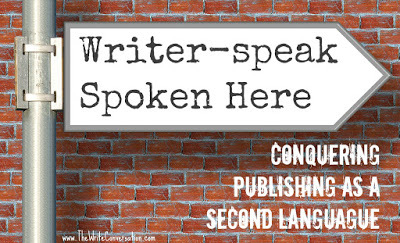 If you missed the first post in this series, Linda covers Glimpses From a Writer's Glossary
If you missed the first post in this series, Linda covers Glimpses From a Writer's Glossary
Of all the terms new writers hear when they begin their careers, cover letter and query letter are some of the more confusing. Both are letters that go to editors, so shouldn’t you just write a good letter and be done with it?
Cover letters and query letters each have their own functions. It may not be a deal breaker if you send one in place of the other, but it may look unprofessional.Cover Letter: A cover letter is used when your material has been requested by an editor or publisher. Its basic purpose is to thank the editor for his or her willingness to look at your manuscript and serve as a reminder of how you are connected.
For example, a cover letter might read something like this. “Dear (Name of Editor), It was such a pleasure meeting you at (Name of Venue). Thank you for the opportunity of sending my manuscript, (Name of Manuscript), for your consideration. I look forward to hearing from you. Sincerely, (Your Name).
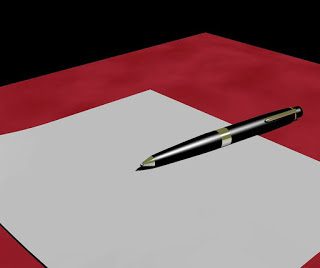 Query Letter: The word “query” comes from the same root word as question. Your query letter is asking a question. The question you are asking the editor is “May I send you my manuscript for consideration?”
Query Letter: The word “query” comes from the same root word as question. Your query letter is asking a question. The question you are asking the editor is “May I send you my manuscript for consideration?”
Your query letter will be longer than a cover letter but no more than one page. Single space with a line space between paragraphs. This is your sales pitch so make it the best sample of your writing that you possibly can. Use business letter format. Be sure to find out the current editor’s name. (This may involve some research.) If you are sending your query letter by snail mail, be sure to include an SASE (self-addressed, stamped envelope).
A good way to start your query letter is to use the opening paragraph of your article or the back cover copy of your book. Then in the next paragraph tell a bit about why you are qualified to write about this subject. This is not the place to list all your educational achievements. Just tell why you are qualified and passionate about the subject. The next paragraph tells more about your manuscript – number of words, status, when it could be delivered, etc. Finally, thank the editor/publisher for his or her time and consideration.
A professional cover letter or query letter could be the editor’s introduction to your writing. Make sure your first impression is a good one.
TWEETABLE
Writers need to know the difference between a cover & a query letter - @LindaGilden (Click to Tweet)
 Linda Gilden is a wife, mother, and grandmother. She finds great joy in time spent with her family. Her favorite activity is floating in a pool with a good book surrounded by splashing children!
Linda Gilden is a wife, mother, and grandmother. She finds great joy in time spent with her family. Her favorite activity is floating in a pool with a good book surrounded by splashing children!
To find out more about Linda, her writing, and her ministry, visit www.lindagilden.com. You can also connect with her on Twitter @LindaGilden and Facebook at Author Linda Gilden.
 If you missed the first post in this series, Linda covers Glimpses From a Writer's Glossary
If you missed the first post in this series, Linda covers Glimpses From a Writer's GlossaryOf all the terms new writers hear when they begin their careers, cover letter and query letter are some of the more confusing. Both are letters that go to editors, so shouldn’t you just write a good letter and be done with it?
Cover letters and query letters each have their own functions. It may not be a deal breaker if you send one in place of the other, but it may look unprofessional.Cover Letter: A cover letter is used when your material has been requested by an editor or publisher. Its basic purpose is to thank the editor for his or her willingness to look at your manuscript and serve as a reminder of how you are connected.
For example, a cover letter might read something like this. “Dear (Name of Editor), It was such a pleasure meeting you at (Name of Venue). Thank you for the opportunity of sending my manuscript, (Name of Manuscript), for your consideration. I look forward to hearing from you. Sincerely, (Your Name).
 Query Letter: The word “query” comes from the same root word as question. Your query letter is asking a question. The question you are asking the editor is “May I send you my manuscript for consideration?”
Query Letter: The word “query” comes from the same root word as question. Your query letter is asking a question. The question you are asking the editor is “May I send you my manuscript for consideration?”Your query letter will be longer than a cover letter but no more than one page. Single space with a line space between paragraphs. This is your sales pitch so make it the best sample of your writing that you possibly can. Use business letter format. Be sure to find out the current editor’s name. (This may involve some research.) If you are sending your query letter by snail mail, be sure to include an SASE (self-addressed, stamped envelope).
A good way to start your query letter is to use the opening paragraph of your article or the back cover copy of your book. Then in the next paragraph tell a bit about why you are qualified to write about this subject. This is not the place to list all your educational achievements. Just tell why you are qualified and passionate about the subject. The next paragraph tells more about your manuscript – number of words, status, when it could be delivered, etc. Finally, thank the editor/publisher for his or her time and consideration.
A professional cover letter or query letter could be the editor’s introduction to your writing. Make sure your first impression is a good one.
TWEETABLE
Writers need to know the difference between a cover & a query letter - @LindaGilden (Click to Tweet)
 Linda Gilden is a wife, mother, and grandmother. She finds great joy in time spent with her family. Her favorite activity is floating in a pool with a good book surrounded by splashing children!
Linda Gilden is a wife, mother, and grandmother. She finds great joy in time spent with her family. Her favorite activity is floating in a pool with a good book surrounded by splashing children!To find out more about Linda, her writing, and her ministry, visit www.lindagilden.com. You can also connect with her on Twitter @LindaGilden and Facebook at Author Linda Gilden.
Published on July 08, 2015 01:00
July 7, 2015
Top 10 Reasons NOT to Become a Novelist
by Edie Melson @EdieMelson
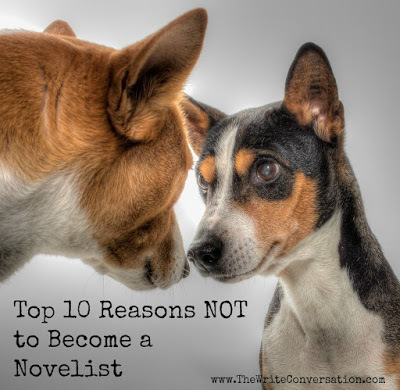 As writers, we tend to have a certain mystique. I wish I had a dime every time someone said, “I’ve always wanted to be a writer!” But the truth is that not everyone has what it takes to write books for a living.
As writers, we tend to have a certain mystique. I wish I had a dime every time someone said, “I’ve always wanted to be a writer!” But the truth is that not everyone has what it takes to write books for a living.
So for those of you considering the profession, or who are already here and are considering getting out, here are 10 reasons NOT to become a novelist!1. You want to make a lot of money.Truth is, writing books, I’m still not breaking even. Freelancing is a different story. But books, well…not so much.
2. You chose this profession because you mom said you were the best writer ever. There are a lot of reasons to become a writer, and family support is important. But truthfully your mom probably isn’t an unbiased advocate.
3. You want job where you can stay at home and have a life. I work harder and put in more hours as a writer than I EVER did at a traditional job. Writing is my life.
 4. You want fame (to go along with the fortune in #1). There are more ways than ever to find your 15 minutes of fame. But writing a book isn’t one of them.
4. You want fame (to go along with the fortune in #1). There are more ways than ever to find your 15 minutes of fame. But writing a book isn’t one of them.
5. You enjoy talking about writing more than the actual writing. Writing groups are full of these folks. They enjoy the creative atmosphere, but are unwilling to actually sit down and commit words to paper.
6. You want to do something where you’re the boss. Yes, you will be working for yourself, and writing novels does give you control over how you schedule your time. But once you begin selling a project, everyone else seems to have more input than you. Your agent, your editors, even the bookstores carry more weight than you.
7. You don’t take criticism well.Professional writers know the best way to get better is by listening—with an open mind—to suggestions. None of us like being told we can improve. Professional writers want to get better more than they want their egos stroked.
 8. You hate to read. Good writers read. Argue all you want, but that’s just a fact.
8. You hate to read. Good writers read. Argue all you want, but that’s just a fact.
9. You can’t stand rejection. Editors and agents reject manuscripts for a variety of reasons, and it often has nothing to do with how well written it is.
10. You can be satisfied doing something other than writing. The truth is, if you can imagine doing anything else, do it.
How about you, can you add any more reasons not to become a novelist to my list?
Don’t forget to join the conversation!Blessings,Edie
TWEETABLESThink you want tobecome a novelist? 10 reasons to fight the impulse -@EdieMelson (click to tweet)
10 Reasons NOTto Become a Novelist - via author @EdieMelson (click to tweet)
 As writers, we tend to have a certain mystique. I wish I had a dime every time someone said, “I’ve always wanted to be a writer!” But the truth is that not everyone has what it takes to write books for a living.
As writers, we tend to have a certain mystique. I wish I had a dime every time someone said, “I’ve always wanted to be a writer!” But the truth is that not everyone has what it takes to write books for a living.So for those of you considering the profession, or who are already here and are considering getting out, here are 10 reasons NOT to become a novelist!1. You want to make a lot of money.Truth is, writing books, I’m still not breaking even. Freelancing is a different story. But books, well…not so much.
2. You chose this profession because you mom said you were the best writer ever. There are a lot of reasons to become a writer, and family support is important. But truthfully your mom probably isn’t an unbiased advocate.
3. You want job where you can stay at home and have a life. I work harder and put in more hours as a writer than I EVER did at a traditional job. Writing is my life.
 4. You want fame (to go along with the fortune in #1). There are more ways than ever to find your 15 minutes of fame. But writing a book isn’t one of them.
4. You want fame (to go along with the fortune in #1). There are more ways than ever to find your 15 minutes of fame. But writing a book isn’t one of them.5. You enjoy talking about writing more than the actual writing. Writing groups are full of these folks. They enjoy the creative atmosphere, but are unwilling to actually sit down and commit words to paper.
6. You want to do something where you’re the boss. Yes, you will be working for yourself, and writing novels does give you control over how you schedule your time. But once you begin selling a project, everyone else seems to have more input than you. Your agent, your editors, even the bookstores carry more weight than you.
7. You don’t take criticism well.Professional writers know the best way to get better is by listening—with an open mind—to suggestions. None of us like being told we can improve. Professional writers want to get better more than they want their egos stroked.
 8. You hate to read. Good writers read. Argue all you want, but that’s just a fact.
8. You hate to read. Good writers read. Argue all you want, but that’s just a fact.9. You can’t stand rejection. Editors and agents reject manuscripts for a variety of reasons, and it often has nothing to do with how well written it is.
10. You can be satisfied doing something other than writing. The truth is, if you can imagine doing anything else, do it.
How about you, can you add any more reasons not to become a novelist to my list?
Don’t forget to join the conversation!Blessings,Edie
TWEETABLESThink you want tobecome a novelist? 10 reasons to fight the impulse -@EdieMelson (click to tweet)
10 Reasons NOTto Become a Novelist - via author @EdieMelson (click to tweet)
Published on July 07, 2015 01:00
July 6, 2015
Social Media Basics for Writers, Part V—How to Use Hashtags in Social Media
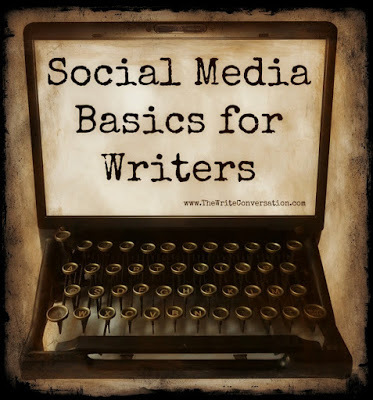 Today I want to jump into one of the most important tool in your social media arsenal, hashtags. But first, in case you've missed the previous posts, here are a list of them, with links.
Today I want to jump into one of the most important tool in your social media arsenal, hashtags. But first, in case you've missed the previous posts, here are a list of them, with links.Part I—Know Where You are and Where You’re Going Part II—When Should a Writer Start Building a Social Media Network Part III—Targeting Millennials: Snapchat’s 3 Most Dominant Brands & Their Tactics Part IV—Dealing with Facebook Spam
Hashtags—especially for Twitter—can be incredibly valuable in helping us increase out audience. But only if we learn to use them correctly.
They’re not that hard, but there are some rules you need to follow so you’re not wasting valuable real estate in your tweets.Hashtag RefresherFirst, lets back up and evaluate the reason we’re all working at building an online presence. We are looking to deepen existing relationships and build new ones. But building new ones can be difficult if the only people we interact with are those we already know, either online or in person.
We can get a little bit of exposure to new folks by our existing connections introducing us, but that’s a time consuming way to go about it.
What if there was a way for someone to search a given social media network by topic and find new, interesting people to interact with? That would be a great way to grow our connections.
 Hashtags make your life easier.THAT, in the simplest of terms, is the purpose of using hashtags.
Hashtags make your life easier.THAT, in the simplest of terms, is the purpose of using hashtags.When you compose a social media update that includes one or two hashtags that summarize the topic—you are giving folks who wouldn’t otherwise have a connection with you—a way to find you.
Here’s an example of the correct way to do this. At the end of this post you’ll find a tweet I composed about today’s post:
Grow your #Writing platform by using hashtags correctly - via #SocialMedia expert @EdieMelson
5 Tips for Using Hashtags Correctly1. Don’t overload your social media updates with hashtags. The optimum number of hashtags depends on the social media network you’re on. Twitter: two hashtags is best, but one or three will also work.Facebook: no more than one hashtag per update, otherwise you may be unintentionally spamming your followersInstagram: two hashtags is best, but one or three will also work here as well.
 Take time to research the best hashtag.2. Take time to research the best hashtags. Some hashtags are better than others. You won’t know which ones are most current unless you take time research them. The best way to do your research? Do a search on the social media network where you want to use the hashtag. You can also research a hashtag by typing it into the Google search engine and seeing what updates come up.
Take time to research the best hashtag.2. Take time to research the best hashtags. Some hashtags are better than others. You won’t know which ones are most current unless you take time research them. The best way to do your research? Do a search on the social media network where you want to use the hashtag. You can also research a hashtag by typing it into the Google search engine and seeing what updates come up. 3. Making up a new hashtag is fine—but ONLY if you pair it with a popular hashtag. If I wanted to try to make #TheWriteConversation into a writing hashtag, it wouldn’t do me any good unless I paired it with another popular #writing hashtag. No one is going to know to search for #TheWriteConversation unless I educate them. If I just use #TheWriteConversation, it’s no more than wasted space in my social media update.
4. Remember a space ends the hashtag.So often I see people forget and add a space in between two words in a hashtag. Once you hit the space bar, the hashtag ends. So #Social Media is really only the hashtag #Social, instead of #SocialMedia. NOTE: this is also true of the @ sign. If I type @Edie Melson, it’s just like I’m typing @Edie, and that person is NOT me.
5. Leave some room at the end of your tweets so your hashtags aren’t cut off if it’s retweeted. Tweets are only 140 characters long. If I use all 140 characters, then if anyone retweets it, the end will be cut off because there’s no room for the retweeters information that goes at the beginning of the tweet. I try to leave 15 – 20 blank characters, but my absolute minimum is 10. This insures at least one unchanged retweet.
Hashtag EtiquetteTry to never use more than three hashtags in any one tweet. If you can make it two that’s even better. Otherwise you end up looking like a used car sales man. If you’re trying to reach more groups, schedule multiple tweets, at different times, about the same subject and target your groups two at a time.
Always research your hashtag before you use it. Never assume it’s the correct one. For example, I was targeting military families with tweets about my devotional for military families and I thought #military would be the logical hashtag. No, turns out that hashtag is frequently used by those trying to date someone in the military. Not really the demographic I was trying to reach. The hashtag I wanted was #militaryfamily and #deployment. The best place to research hashtags is also the easiest, just type it into Google or the search engine of your choice.
I know this is a lot to digest all at once, so I’m happy to answer questions. Be sure to leave your thoughts in the comments section below.
Don’t forget to join the conversation!Blessings,Edie
TWEETABLESGrow your #writing platform by using hashtags correctly – via #socialmedia expert @EdieMelson (Click to Tweet)
Hashtags can be a secret weapon for building your#writing platform –@EdieMelson (Click to Tweet)
Published on July 06, 2015 01:00
July 5, 2015
Thirst
by Sarah Van Diest
 Recently, because “recently” sounds so much better than “yesterday,” I dove so deeply into a pool of feelings that I was completely blind to them. (That’s what happens in addictions, you know.)
Recently, because “recently” sounds so much better than “yesterday,” I dove so deeply into a pool of feelings that I was completely blind to them. (That’s what happens in addictions, you know.)
There is so much emotion here. It’s saturated with feeling. The rut in my mind running from the place where it plays back memories to the place where emotions respond and react is worn smooth. Those memories, imaginings or voices that trigger the feelings I want are the ones I replay. I am an addict hooked on the sensations that fill me and transport me.
You may suppose I’m only talking about things that make me feel good. I’m not. I’m just as addicted to the painful feelings, if not more so.
My husband and two of our sons were working outside. One of our summer projects this year is to finish the driveway area of our house. We live on 5 acres of Christmas trees and since so much of the year’s outdoor labor is spent on some form of tree work, this project of finishing the driveway had waited for 3 years.
 David (my husband) was driving some big piece of machinery moving boulders around while the boys, Caleb and Colin, were cutting back overgrown bushes and shoveling bark dust. I couldn’t resist getting involved. I donned my gloves and ugly work shoes and out I went. I was going to be helpful.
David (my husband) was driving some big piece of machinery moving boulders around while the boys, Caleb and Colin, were cutting back overgrown bushes and shoveling bark dust. I couldn’t resist getting involved. I donned my gloves and ugly work shoes and out I went. I was going to be helpful.
Around lunchtime, the boys asked if they could stop. I figured I would be done in a minute too, so I sent them inside. But I didn’t stop. David kept going on the machine and I kept shoveling and raking out bark. The sun was intense and the cool of the morning was long past. It was now in the 90’s and after several hours of sweaty labor, it hit me. I was exhausted. I had failed to drink water and take breaks. Leaning on my rake the thought flew through my mind that I desperately needed water. Like angels sent from heaven, Colin was suddenly standing in front of me with a glass of water and Caleb had made pb&j’s for us all. What a blessing!
How had I gotten to this place? How had I gone from wanting to help to demanding of myself that I work until I could hardly stand? The rest of the day I had a throbbing headache and dizziness; classic signs of dehydration and overexertion. I know myself well enough to know it wasn’t just about forgetting to drink water. I was, once again, stuck in that deep rut in my mind searching to fill a void.
And that’s where I show you my addiction. The voice, that almost silent, yet penetrating voice, calling out its rules and bullying its way through my mind, is what controls me at times like this. It tells me that my sole worth is found in my performance of the task at hand. It screams at me, though the logic center of my brain can’t make out its words. The part of me so frantic for a declaration of value overrides all other thoughts, rational understandings and sensible perspectives. The thirst for worth overtakes the thirst for water and so I wilt; willing to kill myself if need be to achieve the desired goal of finally feeling significant.
That is an addiction.
How hollow.
If this had been my first experience of succumbing to that voice I might not have realized it so quickly, but I’ve been here hundreds of times before. And yes, it was yesterday. Today my face is slightly swollen and my head still pounds; the sad consequences of my addiction. I never achieved that value I was hoping for by raking out bark, sweating and tweaking my back, and I never do. This is an empty and vain pursuit. And today, sitting in my chair, writing my confession, I know it. Just like I knew it last time.
 So what do we do, my friend? Because I know I’m not the only one. How do we stop ourselves from being slaves to merciless, relentless desires, whatever they may be? Those voices that point out our insufficiencies and our lack? You know the truth and so do I. It seems to me that most, if not all, of my efforts to achieve, or my desires to transport myself to another reality, are all based in my longing to be of worth and value, and yet I know the only true sense of significance is found in my Father’s eyes. I am precious to Him. We are precious to Him. There is nothing we can do to increase or decrease His love for us. So how can we get that truth to infiltrate our minds at the basest of levels?
So what do we do, my friend? Because I know I’m not the only one. How do we stop ourselves from being slaves to merciless, relentless desires, whatever they may be? Those voices that point out our insufficiencies and our lack? You know the truth and so do I. It seems to me that most, if not all, of my efforts to achieve, or my desires to transport myself to another reality, are all based in my longing to be of worth and value, and yet I know the only true sense of significance is found in my Father’s eyes. I am precious to Him. We are precious to Him. There is nothing we can do to increase or decrease His love for us. So how can we get that truth to infiltrate our minds at the basest of levels?
Obviously I haven’t fully figured this one out. All I know is what Scripture tells us: to be transformed by the renewing of our minds and that through His word, and by His Spirit, we are made new; and that the truth will set us free.
My faith is not a perfected thing. It is a growing thing. I am in constant need of grace and reminders of truth from the Holy Spirit. I am dependent on my Father to walk this life in faith. And you know what? That’s exactly where we are supposed to be. That is where we find rest and peace and hope and strength. It’s not in my ability to do this life well, in my striving, pushing, gritting it up the next hill; it’s in my sense of need and reliance on my Father where I find what I seek. It is a beautiful irony. My need is His avenue through which He communicates how much He values me. If I stand perfected in my own strength, what need do I have of the Father? But when I come to Him lacking the strength to turn from my addiction, He looks at me with love, pulls me close, and reminds me of my worth to Him. In that moment, when I am remembering, accepting and embracing the truth, I am strong because I know the Creator of the universe loves me!
In my weakness, He is strong.
Be weak today, my friend. See your “failures” for the blessings they are. They tie us, bind us and entwine our hearts in unity with our Father, declaring our need for Him and His faithfulness to us.
“No temptation has overtaken you that is not common to man. God is faithful, and he will not let you be tempted beyond your ability, but with the temptation he will also provide the way of escape, that you may be able to endure it” 1 Corinthians 10:13.
“What if some were unfaithful? Does their faithlessness nullify the faithfulness of God?” Romans 3:3.
“The steadfast love of the LORD never ceases; his mercies never come to an end; they are new every morning; great is your faithfulness” Lamentations 3:22-23.
 Sarah has worked in Christian publishing since 2005 as both and editor and an agent.
Sarah has worked in Christian publishing since 2005 as both and editor and an agent.
Currently, she works with her husband, David, in their agency, the Van Diest Literary Agency. Writing is a growing passion for her as she hopes to bring hope to hurting hearts.
 Recently, because “recently” sounds so much better than “yesterday,” I dove so deeply into a pool of feelings that I was completely blind to them. (That’s what happens in addictions, you know.)
Recently, because “recently” sounds so much better than “yesterday,” I dove so deeply into a pool of feelings that I was completely blind to them. (That’s what happens in addictions, you know.)There is so much emotion here. It’s saturated with feeling. The rut in my mind running from the place where it plays back memories to the place where emotions respond and react is worn smooth. Those memories, imaginings or voices that trigger the feelings I want are the ones I replay. I am an addict hooked on the sensations that fill me and transport me.
You may suppose I’m only talking about things that make me feel good. I’m not. I’m just as addicted to the painful feelings, if not more so.
My husband and two of our sons were working outside. One of our summer projects this year is to finish the driveway area of our house. We live on 5 acres of Christmas trees and since so much of the year’s outdoor labor is spent on some form of tree work, this project of finishing the driveway had waited for 3 years.
 David (my husband) was driving some big piece of machinery moving boulders around while the boys, Caleb and Colin, were cutting back overgrown bushes and shoveling bark dust. I couldn’t resist getting involved. I donned my gloves and ugly work shoes and out I went. I was going to be helpful.
David (my husband) was driving some big piece of machinery moving boulders around while the boys, Caleb and Colin, were cutting back overgrown bushes and shoveling bark dust. I couldn’t resist getting involved. I donned my gloves and ugly work shoes and out I went. I was going to be helpful. Around lunchtime, the boys asked if they could stop. I figured I would be done in a minute too, so I sent them inside. But I didn’t stop. David kept going on the machine and I kept shoveling and raking out bark. The sun was intense and the cool of the morning was long past. It was now in the 90’s and after several hours of sweaty labor, it hit me. I was exhausted. I had failed to drink water and take breaks. Leaning on my rake the thought flew through my mind that I desperately needed water. Like angels sent from heaven, Colin was suddenly standing in front of me with a glass of water and Caleb had made pb&j’s for us all. What a blessing!
How had I gotten to this place? How had I gone from wanting to help to demanding of myself that I work until I could hardly stand? The rest of the day I had a throbbing headache and dizziness; classic signs of dehydration and overexertion. I know myself well enough to know it wasn’t just about forgetting to drink water. I was, once again, stuck in that deep rut in my mind searching to fill a void.
And that’s where I show you my addiction. The voice, that almost silent, yet penetrating voice, calling out its rules and bullying its way through my mind, is what controls me at times like this. It tells me that my sole worth is found in my performance of the task at hand. It screams at me, though the logic center of my brain can’t make out its words. The part of me so frantic for a declaration of value overrides all other thoughts, rational understandings and sensible perspectives. The thirst for worth overtakes the thirst for water and so I wilt; willing to kill myself if need be to achieve the desired goal of finally feeling significant.
That is an addiction.
How hollow.
If this had been my first experience of succumbing to that voice I might not have realized it so quickly, but I’ve been here hundreds of times before. And yes, it was yesterday. Today my face is slightly swollen and my head still pounds; the sad consequences of my addiction. I never achieved that value I was hoping for by raking out bark, sweating and tweaking my back, and I never do. This is an empty and vain pursuit. And today, sitting in my chair, writing my confession, I know it. Just like I knew it last time.
 So what do we do, my friend? Because I know I’m not the only one. How do we stop ourselves from being slaves to merciless, relentless desires, whatever they may be? Those voices that point out our insufficiencies and our lack? You know the truth and so do I. It seems to me that most, if not all, of my efforts to achieve, or my desires to transport myself to another reality, are all based in my longing to be of worth and value, and yet I know the only true sense of significance is found in my Father’s eyes. I am precious to Him. We are precious to Him. There is nothing we can do to increase or decrease His love for us. So how can we get that truth to infiltrate our minds at the basest of levels?
So what do we do, my friend? Because I know I’m not the only one. How do we stop ourselves from being slaves to merciless, relentless desires, whatever they may be? Those voices that point out our insufficiencies and our lack? You know the truth and so do I. It seems to me that most, if not all, of my efforts to achieve, or my desires to transport myself to another reality, are all based in my longing to be of worth and value, and yet I know the only true sense of significance is found in my Father’s eyes. I am precious to Him. We are precious to Him. There is nothing we can do to increase or decrease His love for us. So how can we get that truth to infiltrate our minds at the basest of levels? Obviously I haven’t fully figured this one out. All I know is what Scripture tells us: to be transformed by the renewing of our minds and that through His word, and by His Spirit, we are made new; and that the truth will set us free.
My faith is not a perfected thing. It is a growing thing. I am in constant need of grace and reminders of truth from the Holy Spirit. I am dependent on my Father to walk this life in faith. And you know what? That’s exactly where we are supposed to be. That is where we find rest and peace and hope and strength. It’s not in my ability to do this life well, in my striving, pushing, gritting it up the next hill; it’s in my sense of need and reliance on my Father where I find what I seek. It is a beautiful irony. My need is His avenue through which He communicates how much He values me. If I stand perfected in my own strength, what need do I have of the Father? But when I come to Him lacking the strength to turn from my addiction, He looks at me with love, pulls me close, and reminds me of my worth to Him. In that moment, when I am remembering, accepting and embracing the truth, I am strong because I know the Creator of the universe loves me!
In my weakness, He is strong.
Be weak today, my friend. See your “failures” for the blessings they are. They tie us, bind us and entwine our hearts in unity with our Father, declaring our need for Him and His faithfulness to us.
“No temptation has overtaken you that is not common to man. God is faithful, and he will not let you be tempted beyond your ability, but with the temptation he will also provide the way of escape, that you may be able to endure it” 1 Corinthians 10:13.
“What if some were unfaithful? Does their faithlessness nullify the faithfulness of God?” Romans 3:3.
“The steadfast love of the LORD never ceases; his mercies never come to an end; they are new every morning; great is your faithfulness” Lamentations 3:22-23.
 Sarah has worked in Christian publishing since 2005 as both and editor and an agent.
Sarah has worked in Christian publishing since 2005 as both and editor and an agent. Currently, she works with her husband, David, in their agency, the Van Diest Literary Agency. Writing is a growing passion for her as she hopes to bring hope to hurting hearts.
Published on July 05, 2015 01:00
July 4, 2015
Happy Fourth of July!
Happy Fourth of July!

Share your thoughts in the comment section below.
I also invite you to use this image any way you like online. Post it to your blog, share it on Facebook, Twitter, Pinterest, anywhere you'd like. All I ask is that you keep it intact, with my website watermark visible.
Don't forget to join the conversation!Blessings,Edie

Share your thoughts in the comment section below.
I also invite you to use this image any way you like online. Post it to your blog, share it on Facebook, Twitter, Pinterest, anywhere you'd like. All I ask is that you keep it intact, with my website watermark visible.
Don't forget to join the conversation!Blessings,Edie
Published on July 04, 2015 03:52
July 3, 2015
The Big Cs of Writing
by Bruce Brady @BDBrady007
 Tomorrow we, as a nation, celebrate the day our ancestors declared their independence from dictatorial government. The monarchy increasingly pressed for greater control over their lives until they’d had enough.
Tomorrow we, as a nation, celebrate the day our ancestors declared their independence from dictatorial government. The monarchy increasingly pressed for greater control over their lives until they’d had enough.
Political pressures continued until tensions reached a crisis. Colonists knew they were called to establish a new country—one that would allow its citizens to freely worship God and create a new form of government that serves the people. Like David, they faced their giant, committing themselves to sever their bonds with their oppressors. No matter what.
Recently, I found myself facing a crisis. I listened to my doctor say, “You have metastatic prostate cancer that has metastasized to your bones. We can’t cure it. All we can do is manage its growth and your pain.”
 The Lord instantly blessed me with an awesome peace. Knowing I was in good hands whether I live or die kept me from plunging into depression. I did, however, begin concocting reasons I can’t finish the novel I’ve been working on for well over a year.
The Lord instantly blessed me with an awesome peace. Knowing I was in good hands whether I live or die kept me from plunging into depression. I did, however, begin concocting reasons I can’t finish the novel I’ve been working on for well over a year.
I’d like to be traditionally published but there’s a good chance I won’t live that long. Writing is hard enough for healthy people, now I have the added complication of being unable to sit or stand for more than a few minutes before I’m racked with pain. Many publishers are looking for a long term, multi-book relationship. That’s not looking too good for me.
Hey! These were great arguments. And I had plenty more. God didn’t buy them. He reminded me that I was called to serve Him through the written word. He also reminded me that He controls when I die.
I responded by committing myself to finishing the novel, even if it’s never published. I’ll do it for the readers without regard to financial rewards or professional accolades. I’ll trust Him for the words and the results.
 So why am I writing this? Because I know that if you’re reading it, you’re called to write for Him also. Whatever crisis you may or will face, remember your calling. You may not receive instant peace like I did. Don’t give up. Your voice is the only one that will reach some readers. Others may come close, but your words are the exact words they need to read or hear. Never lose sight of that.
So why am I writing this? Because I know that if you’re reading it, you’re called to write for Him also. Whatever crisis you may or will face, remember your calling. You may not receive instant peace like I did. Don’t give up. Your voice is the only one that will reach some readers. Others may come close, but your words are the exact words they need to read or hear. Never lose sight of that.
Armed with your new resolve, commit yourself to finishing what you started. Instead of looking for reasons not to write, visualize your audience and press on. Do as much as you can whenever you can. Forget about whether you’ll get published or if anyone will like it. If you never make a dime and only reach one person, so what? Stay true to your calling and follow through. It will greatly improve your outlook on life and your situation.
So what crisis are you facing? How are you handling it? Let’s keep this conversation going.
TWEETABLEOne of The Big Cs of #Writing - commit to finishing strong - @BDBrady007 on @EdieMelson (Click to Tweet)
 Bruce Brady is an author, writer and playwright. His work has appeared in Focus on the Family’s Thriving Family, www.ChristianDevotions.us, and on stage. Currently, Bruce is working on a Young Adult Novel about a boy who must deal with the death of his dad, being bullied, and helping his mom through her grief. His first five pages took third place in the ACFW South Carolina Chapter’s “First Five Pages” contest.
Bruce Brady is an author, writer and playwright. His work has appeared in Focus on the Family’s Thriving Family, www.ChristianDevotions.us, and on stage. Currently, Bruce is working on a Young Adult Novel about a boy who must deal with the death of his dad, being bullied, and helping his mom through her grief. His first five pages took third place in the ACFW South Carolina Chapter’s “First Five Pages” contest.
When he’s not writing, Bruce spends time learning from and helping other writers. He serves as Mentor of Word Weavers International’s Online Chapter, and as a member of Cross ‘N’ Pens, The Writer’s Plot, ACFW’s National and South Carolina Chapters.
“My dream is to entertain my readers and give them hope as they travel the rocky road of life.”
 Tomorrow we, as a nation, celebrate the day our ancestors declared their independence from dictatorial government. The monarchy increasingly pressed for greater control over their lives until they’d had enough.
Tomorrow we, as a nation, celebrate the day our ancestors declared their independence from dictatorial government. The monarchy increasingly pressed for greater control over their lives until they’d had enough.Political pressures continued until tensions reached a crisis. Colonists knew they were called to establish a new country—one that would allow its citizens to freely worship God and create a new form of government that serves the people. Like David, they faced their giant, committing themselves to sever their bonds with their oppressors. No matter what.
Recently, I found myself facing a crisis. I listened to my doctor say, “You have metastatic prostate cancer that has metastasized to your bones. We can’t cure it. All we can do is manage its growth and your pain.”
 The Lord instantly blessed me with an awesome peace. Knowing I was in good hands whether I live or die kept me from plunging into depression. I did, however, begin concocting reasons I can’t finish the novel I’ve been working on for well over a year.
The Lord instantly blessed me with an awesome peace. Knowing I was in good hands whether I live or die kept me from plunging into depression. I did, however, begin concocting reasons I can’t finish the novel I’ve been working on for well over a year.I’d like to be traditionally published but there’s a good chance I won’t live that long. Writing is hard enough for healthy people, now I have the added complication of being unable to sit or stand for more than a few minutes before I’m racked with pain. Many publishers are looking for a long term, multi-book relationship. That’s not looking too good for me.
Hey! These were great arguments. And I had plenty more. God didn’t buy them. He reminded me that I was called to serve Him through the written word. He also reminded me that He controls when I die.
I responded by committing myself to finishing the novel, even if it’s never published. I’ll do it for the readers without regard to financial rewards or professional accolades. I’ll trust Him for the words and the results.
 So why am I writing this? Because I know that if you’re reading it, you’re called to write for Him also. Whatever crisis you may or will face, remember your calling. You may not receive instant peace like I did. Don’t give up. Your voice is the only one that will reach some readers. Others may come close, but your words are the exact words they need to read or hear. Never lose sight of that.
So why am I writing this? Because I know that if you’re reading it, you’re called to write for Him also. Whatever crisis you may or will face, remember your calling. You may not receive instant peace like I did. Don’t give up. Your voice is the only one that will reach some readers. Others may come close, but your words are the exact words they need to read or hear. Never lose sight of that.Armed with your new resolve, commit yourself to finishing what you started. Instead of looking for reasons not to write, visualize your audience and press on. Do as much as you can whenever you can. Forget about whether you’ll get published or if anyone will like it. If you never make a dime and only reach one person, so what? Stay true to your calling and follow through. It will greatly improve your outlook on life and your situation.
So what crisis are you facing? How are you handling it? Let’s keep this conversation going.
TWEETABLEOne of The Big Cs of #Writing - commit to finishing strong - @BDBrady007 on @EdieMelson (Click to Tweet)
 Bruce Brady is an author, writer and playwright. His work has appeared in Focus on the Family’s Thriving Family, www.ChristianDevotions.us, and on stage. Currently, Bruce is working on a Young Adult Novel about a boy who must deal with the death of his dad, being bullied, and helping his mom through her grief. His first five pages took third place in the ACFW South Carolina Chapter’s “First Five Pages” contest.
Bruce Brady is an author, writer and playwright. His work has appeared in Focus on the Family’s Thriving Family, www.ChristianDevotions.us, and on stage. Currently, Bruce is working on a Young Adult Novel about a boy who must deal with the death of his dad, being bullied, and helping his mom through her grief. His first five pages took third place in the ACFW South Carolina Chapter’s “First Five Pages” contest.When he’s not writing, Bruce spends time learning from and helping other writers. He serves as Mentor of Word Weavers International’s Online Chapter, and as a member of Cross ‘N’ Pens, The Writer’s Plot, ACFW’s National and South Carolina Chapters.
“My dream is to entertain my readers and give them hope as they travel the rocky road of life.”
Published on July 03, 2015 01:00
July 2, 2015
One Writing Book Every Writer Needs, Super Structure
by Lynn Blackburn @LynnHBlackburn
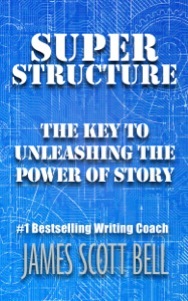 Every time I see a book on “structure” or “story” I find myself bracing for the inevitable battle. If you’ve hung around with writers for long you know why, don’t you?
Every time I see a book on “structure” or “story” I find myself bracing for the inevitable battle. If you’ve hung around with writers for long you know why, don’t you?
Someone is about to get in an argument about THE way to write. In my mind, I see a group of literary protesters. “Structure Leads to Perfect Stories!” shouts one side. “Structure Leads to Predictable Stories!” counters the other.
I see myself standing in the middle of the crowd singing, “LET IT GO!”
Don’t get me wrong. If someone has figured out how they write, I want them to tell me how they do it. I really do.But I have absolutely no illusions that the way they do it is going to wind up being the way I do it. I wish it would work that way but I know a lot of writers, and I have yet to meet one who writes exactly like someone else.
I’m okay with that. It’s part of the mystery of story…and I love a good mystery.
 When I pick up a book on the craft, I’m not searching for the holy grail of literary longevity. I’ve given up on finding a book that I can follow step by step onto the New York Times Bestsellers list.
When I pick up a book on the craft, I’m not searching for the holy grail of literary longevity. I’ve given up on finding a book that I can follow step by step onto the New York Times Bestsellers list.
I’m just looking for a few tips that I can implement in my own hodgepodge way of uncovering the story that’s trying to be told through me.
Super Structure by James Scott Bell had more than a few gems. Even if you’ve read every book he’s written on the craft (as I have) you’ll still find some new information and new ways of looking at things that will be useful as you craft your story. And it really doesn’t matter whether you consider yourself a plotter, an organic writer (my preferred term for “pantsers”), or if you fall somewhere in between (“plantser?”). I think this book would be well worth your time.
With a title like Super Structure , you might expect a book that expounds on the necessity of an outline.
But that’s not what Super Structure is.
Sure, he spends the first 15% of the book arguing for his preferred method (he says at one point that it’s starting to sound like a legal brief). If you’re a plotter you’ll be eating it up, but if you write more organically don’t let it get you down.
The 14 Signposts that he says make up the super structure of all good stories are important to know, no matter how you choose to implement them.
Here they are:
Act I (no greater than 20% of your novel) 1. Disturbance 2. Care Package 3. Argument against Transformation 4. Trouble Brewing 5. Doorway of No Return #1
Act II (that large middle portion where the main action takes place) 6. Kick in the Shins 7. The Mirror Moment 8. Pet the Dog 9. Doorway of No Return #2
Act III (the resolution) 10. Mounting Forces 11. Lights Out 12. Q Factor 13. Final Battle 14. Transformation
In typical James Scott Bell fashion, each point is explained in a very conversational style with multiple examples from movies and literature. He concludes each section with a “Why This Works” explanation and then “Helpful Hints for Plotters and Pantsers” where he gives ideas for how to use each signpost regardless of how you prefer to write.
I’ll be thinking about these signposts and referring to Super Structure often as I discover what my story is about it, and as I continue to figure out what method of writing works best for me.
So how about you? Are you a plotter? Do you write organically? Have you tried to write one way and failed? Tell us about it in the comments!
Don’t forget to join the conversation!
TWEETABLEOne #writing book every writer needs, Super Structure by @JamesScottBell, via @LynnHBlackburn (Click to Tweet)
 Lynn Huggins Blackburn believes in the power of stories, especially those that remind us that true love exists, a gift from the Truest Love. She’s passionate about CrossFit, coffee, and chocolate (don’t make her choose) and experimenting with recipes that feed both body and soul. She lives in South Carolina with her true love, Brian, and their three children. You can follow her real life happily ever after at http://www.lynnhugginsblackburn.com.
Lynn Huggins Blackburn believes in the power of stories, especially those that remind us that true love exists, a gift from the Truest Love. She’s passionate about CrossFit, coffee, and chocolate (don’t make her choose) and experimenting with recipes that feed both body and soul. She lives in South Carolina with her true love, Brian, and their three children. You can follow her real life happily ever after at http://www.lynnhugginsblackburn.com.
 Every time I see a book on “structure” or “story” I find myself bracing for the inevitable battle. If you’ve hung around with writers for long you know why, don’t you?
Every time I see a book on “structure” or “story” I find myself bracing for the inevitable battle. If you’ve hung around with writers for long you know why, don’t you? Someone is about to get in an argument about THE way to write. In my mind, I see a group of literary protesters. “Structure Leads to Perfect Stories!” shouts one side. “Structure Leads to Predictable Stories!” counters the other.
I see myself standing in the middle of the crowd singing, “LET IT GO!”
Don’t get me wrong. If someone has figured out how they write, I want them to tell me how they do it. I really do.But I have absolutely no illusions that the way they do it is going to wind up being the way I do it. I wish it would work that way but I know a lot of writers, and I have yet to meet one who writes exactly like someone else.
I’m okay with that. It’s part of the mystery of story…and I love a good mystery.
 When I pick up a book on the craft, I’m not searching for the holy grail of literary longevity. I’ve given up on finding a book that I can follow step by step onto the New York Times Bestsellers list.
When I pick up a book on the craft, I’m not searching for the holy grail of literary longevity. I’ve given up on finding a book that I can follow step by step onto the New York Times Bestsellers list.I’m just looking for a few tips that I can implement in my own hodgepodge way of uncovering the story that’s trying to be told through me.
Super Structure by James Scott Bell had more than a few gems. Even if you’ve read every book he’s written on the craft (as I have) you’ll still find some new information and new ways of looking at things that will be useful as you craft your story. And it really doesn’t matter whether you consider yourself a plotter, an organic writer (my preferred term for “pantsers”), or if you fall somewhere in between (“plantser?”). I think this book would be well worth your time.
With a title like Super Structure , you might expect a book that expounds on the necessity of an outline.
But that’s not what Super Structure is.
Sure, he spends the first 15% of the book arguing for his preferred method (he says at one point that it’s starting to sound like a legal brief). If you’re a plotter you’ll be eating it up, but if you write more organically don’t let it get you down.
The 14 Signposts that he says make up the super structure of all good stories are important to know, no matter how you choose to implement them.
Here they are:
Act I (no greater than 20% of your novel) 1. Disturbance 2. Care Package 3. Argument against Transformation 4. Trouble Brewing 5. Doorway of No Return #1
Act II (that large middle portion where the main action takes place) 6. Kick in the Shins 7. The Mirror Moment 8. Pet the Dog 9. Doorway of No Return #2
Act III (the resolution) 10. Mounting Forces 11. Lights Out 12. Q Factor 13. Final Battle 14. Transformation
In typical James Scott Bell fashion, each point is explained in a very conversational style with multiple examples from movies and literature. He concludes each section with a “Why This Works” explanation and then “Helpful Hints for Plotters and Pantsers” where he gives ideas for how to use each signpost regardless of how you prefer to write.
I’ll be thinking about these signposts and referring to Super Structure often as I discover what my story is about it, and as I continue to figure out what method of writing works best for me.
So how about you? Are you a plotter? Do you write organically? Have you tried to write one way and failed? Tell us about it in the comments!
Don’t forget to join the conversation!
TWEETABLEOne #writing book every writer needs, Super Structure by @JamesScottBell, via @LynnHBlackburn (Click to Tweet)
 Lynn Huggins Blackburn believes in the power of stories, especially those that remind us that true love exists, a gift from the Truest Love. She’s passionate about CrossFit, coffee, and chocolate (don’t make her choose) and experimenting with recipes that feed both body and soul. She lives in South Carolina with her true love, Brian, and their three children. You can follow her real life happily ever after at http://www.lynnhugginsblackburn.com.
Lynn Huggins Blackburn believes in the power of stories, especially those that remind us that true love exists, a gift from the Truest Love. She’s passionate about CrossFit, coffee, and chocolate (don’t make her choose) and experimenting with recipes that feed both body and soul. She lives in South Carolina with her true love, Brian, and their three children. You can follow her real life happily ever after at http://www.lynnhugginsblackburn.com.
Published on July 02, 2015 01:00



